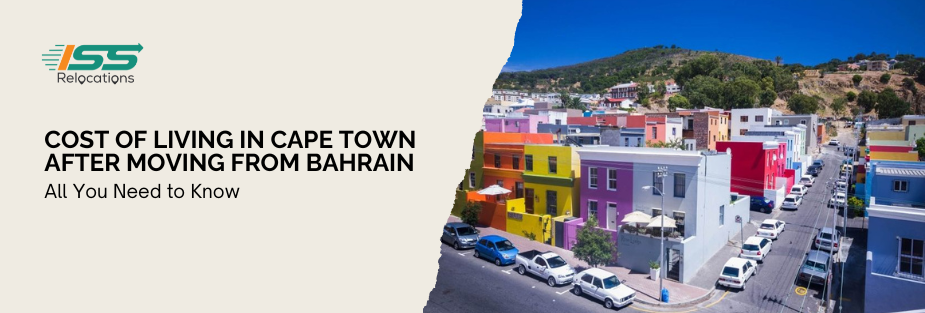
Cost of Living in Cape Town after moving from Bahrain – All You Need to Know
Relocating from Bahrain to Cape Town presents a shift in lifestyle, climate, and financial planning. While Cape Town offers stunning landscapes, diverse culture, and a slower pace of life, understanding the cost of living in Cape Town is essential for a smooth transition. Prices for housing, daily expenses, and services can differ significantly from Bahrain, making it crucial to plan ahead.
Compared to Bahrain, where tax-free income and subsidized utilities help lower living costs, Cape Town has a different economic structure. The South African Rand (ZAR) fluctuates, impacting expenses like rent, groceries, and transport. Expats should evaluate the cost of living in Cape Town carefully to align their budget with local expenses.
Beyond financial considerations, Cape Town offers a lower cost of leisure and entertainment compared to Bahrain, making it an attractive destination for those who value a balanced lifestyle. However, factors like load shedding (power outages), varying rental costs, and differing public transport systems may affect budgeting strategies. Understanding these expenses in detail helps expats adjust smoothly to life in South Africa’s Mother City.
Cost of Living in Cape Town: Housing, Utilities, and More
Renting vs. Buying Property
The cost of living in Cape Town heavily depends on housing expenses. Rental prices vary based on location, property size, and amenities. City center apartments are more expensive, while suburban areas offer more affordability. On average, a one-bedroom apartment in central areas like the City Bowl or Sea Point can cost between ZAR 10,000 and ZAR 15,000 per month. In suburban regions like Table View or Plumstead, the same unit costs around ZAR 6,000 to ZAR 9,000.
Buying property in Cape Town is an option for long-term residents, but it comes with high costs. Property prices in prime locations like Camps Bay or Clifton can exceed ZAR 30 million, whereas more affordable options in outer suburbs range from ZAR 1 million to ZAR 3 million. Mortgage rates in South Africa are higher than in Bahrain, making renting a more feasible option for expats unfamiliar with the market.
Utility Bills and Internet Expenses
Unlike Bahrain, where utility costs are low due to government subsidies, the cost of living in Cape Town includes relatively high electricity and water expenses. Monthly electricity bills range from ZAR 800 to ZAR 2,000, depending on usage and the impact of load shedding. Water bills vary but typically fall between ZAR 500 and ZAR 1,200 per month.
Internet services in Cape Town are competitive, with fiber optic options available in most areas. A standard 50 Mbps uncapped connection costs between ZAR 700 and ZAR 1,200 per month. Mobile plans also vary, with prepaid data starting at ZAR 99 for 1GB, while contract plans offer better value at ZAR 500 to ZAR 1,000 per month.
Relocating in Cape Town?
Begin Your Stress-Free Relocation Journey Today – Request A Quote Now!
Daily Expenses: Groceries, Dining, and Household Items
Grocery Shopping Costs
Grocery prices play a major role in determining the cost of living in Cape Town. While local markets and discount supermarkets provide budget-friendly options, imported goods and premium brands can be expensive. A monthly grocery bill for a single person ranges from ZAR 3,500 to ZAR 6,000, depending on shopping habits.
Staple food items are relatively affordable. A loaf of bread costs around ZAR 18, while a liter of milk is priced at ZAR 20. Fresh vegetables and fruits are widely available, with a kilogram of apples priced at approximately ZAR 30. Meat prices vary, with chicken costing around ZAR 85 per kilogram and beef reaching ZAR 160 per kilogram.
Compared to Bahrain, where food imports from neighboring Gulf countries keep prices stable, Cape Town’s grocery costs fluctuate based on exchange rates and supply chain factors. Shopping at local farmer’s markets can help reduce expenses while ensuring fresh produce.
Eating Out: Restaurants, Cafés, and Street Food
Dining out is an essential part of lifestyle expenses when assessing the cost of living in Cape Town. Restaurants range from budget-friendly eateries to fine-dining establishments. A meal at an inexpensive restaurant costs between ZAR 120 and ZAR 180, while a mid-range three-course meal for two averages ZAR 700 to ZAR 1,200.
Cape Town’s café culture is strong, with coffee prices ranging from ZAR 25 for a basic espresso to ZAR 50 for a specialty brew. Fast food meals at international chains cost around ZAR 90, making them an affordable option for quick dining. Street food vendors offer local specialties like bunny chow or boerewors rolls for under ZAR 80, providing a budget-friendly way to enjoy South African cuisine.
Compared to Bahrain, where international cuisine dominates the dining scene, Cape Town offers a mix of local flavors and global influences. While fine dining in Cape Town is generally cheaper than in Bahrain, the cost of imported beverages and certain luxury food items can be higher.
Transportation Costs: Getting Around in Cape Town
Understanding transportation expenses is essential when evaluating the cost of living in Cape Town. Unlike Bahrain, where public transport is limited, Cape Town offers multiple commuting options, including buses, minibus taxis, trains, and private vehicles. Transportation costs vary depending on daily travel needs, making it important for expats to plan accordingly.
Public Transport: Buses, Minibus Taxis, and Trains
The MyCiTi bus system is the most reliable form of public transport in Cape Town, offering affordable and efficient travel across key areas. A single journey costs between ZAR 10 and ZAR 30, depending on distance. Monthly MyCiTi travel cards range from ZAR 800 to ZAR 1,200, making them a cost-effective option for regular commuters.
Minibus taxis are widely used but come with safety concerns. These taxis operate on fixed routes and are much cheaper than buses, with fares starting at ZAR 10 for short trips. However, they lack strict regulations, making them less predictable.
Trains provide another mode of transport but are often unreliable due to service disruptions. A monthly train pass costs between ZAR 600 and ZAR 1,000, depending on the route and class of service. While train travel is the most affordable option, it is not the most efficient or safest choice for daily commuters.
Owning a Car in Cape Town
For expats who prefer personal vehicles, car ownership is a significant factor in the cost of living in Cape Town. Fuel prices fluctuate but generally range from ZAR 22 to ZAR 26 per liter. A full tank of petrol costs between ZAR 1,000 and ZAR 1,500, depending on the vehicle’s fuel efficiency.
Car insurance is a necessary expense, with monthly premiums ranging from ZAR 800 for basic coverage to over ZAR 2,500 for comprehensive policies. Additional costs include annual vehicle licensing fees of approximately ZAR 900 and regular maintenance, which can add up to ZAR 5,000 per year.
Parking fees vary depending on location. In central business districts, hourly parking rates range from ZAR 10 to ZAR 50. Monthly parking in secure garages costs between ZAR 1,500 and ZAR 3,000, which is a crucial expense for those working in the city center.
Healthcare Costs: Medical Services and Insurance
Healthcare expenses are an important part of the cost of living in Cape Town. While South Africa has both public and private healthcare systems, expats often prefer private medical services due to higher quality and shorter waiting times. Medical costs vary depending on treatment type and insurance coverage.
Public vs. Private Healthcare
Public healthcare in Cape Town is accessible but often overcrowded. Government hospitals provide low-cost medical services, with consultation fees starting at ZAR 100. However, long waiting times and limited resources make public healthcare less appealing for expats.
Private healthcare facilities offer world-class medical services, but at a higher cost. A general practitioner (GP) consultation in a private clinic costs between ZAR 400 and ZAR 1,200. Specialist visits range from ZAR 1,000 to ZAR 3,000, depending on the doctor’s expertise.
Hospitalization in private hospitals is costly, with daily rates starting at ZAR 3,000 for standard rooms and exceeding ZAR 10,000 for intensive care. Maternity services, surgeries, and emergency care can significantly impact the cost of living in Cape Town, making health insurance essential for financial security.
Health Insurance for Expats
Health insurance is a necessary investment for expats moving to Cape Town. Monthly premiums for private health insurance range from ZAR 1,500 for basic coverage to over ZAR 6,000 for comprehensive plans. Popular medical aid schemes cover hospital visits, specialist consultations, and prescription medications.
Without insurance, medical expenses can quickly add up. A single dental procedure costs between ZAR 800 and ZAR 3,000, while routine blood tests range from ZAR 500 to ZAR 2,000. Optometry services, including eye tests and prescription glasses, can cost between ZAR 1,500 and ZAR 5,000, depending on the provider.
Compared to Bahrain, where healthcare services are heavily subsidized, medical costs in Cape Town can be expensive. Expats should carefully choose an insurance plan that aligns with their healthcare needs to avoid unexpected financial burdens.
Education Expenses: Schools and Universities
Education costs contribute significantly to the cost of living in Cape Town, particularly for expats with children. School fees vary depending on whether a child attends a public, private, or international institution. University tuition fees also differ based on the course and institution.
International and Private Schools
Expats moving from Bahrain to Cape Town often prefer private or international schools for their children. Tuition fees for international schools range from ZAR 80,000 to ZAR 250,000 per year, depending on the school’s reputation and curriculum. Schools such as the International School of Cape Town and the American International School of Cape Town offer globally recognized education but come with high costs.
Private schools are more affordable than international institutions but still require a substantial financial commitment. Annual fees for private schools range from ZAR 50,000 to ZAR 150,000. Additional costs include uniforms, textbooks, extracurricular activities, and transportation, which add another ZAR 20,000 to ZAR 50,000 per year.
Public schools in Cape Town are significantly cheaper, with annual fees ranging from ZAR 5,000 to ZAR 30,000. However, they may not offer the same level of resources or curriculum compatibility for expat children, making them a less popular choice among international families.
Higher Education Costs
For those pursuing higher education, university tuition fees are a key aspect of the cost of living in Cape Town. Local universities, including the University of Cape Town (UCT) and Stellenbosch University, charge between ZAR 50,000 and ZAR 120,000 per year for undergraduate programs. Postgraduate studies can cost between ZAR 70,000 and ZAR 200,000 annually, depending on the degree and field of study.
Student accommodation adds to overall education expenses. On-campus residences range from ZAR 4,000 to ZAR 8,000 per month, while private student apartments cost between ZAR 6,000 and ZAR 12,000. Meal plans, textbooks, and additional study materials contribute an extra ZAR 20,000 to ZAR 50,000 per year.
Compared to Bahrain, where higher education institutions receive government support, university fees in Cape Town are more expensive. Scholarships and financial aid options are available for international students, but self-funded education can significantly impact an expat’s budget.
Leisure, Entertainment, and Lifestyle Expenses
Balancing work and leisure is essential for expats moving to Cape Town. The city offers diverse recreational activities, from outdoor adventures to nightlife and entertainment. The cost of living in Cape Town is influenced by lifestyle choices, with expenses for gym memberships, social outings, and travel varying based on personal preferences. While some activities are affordable, others can add to monthly expenses, making it important to plan accordingly.
Fitness, Sports, and Outdoor Activities
Staying active is an important part of daily life in Cape Town. Gym memberships range from ZAR 400 at budget gyms to ZAR 1,500 at premium fitness centers. Many gyms offer personal training services at additional costs of ZAR 300 to ZAR 700 per session. Boutique fitness studios, including yoga, Pilates, and CrossFit centers, charge between ZAR 800 and ZAR 2,000 per month, depending on location and membership type.
For those who prefer outdoor fitness, Cape Town offers many free options. Hiking trails such as Table Mountain and Lion’s Head are accessible without entry fees, while beach activities, surfing, and cycling are popular low-cost alternatives. Surfboard rentals cost between ZAR 150 and ZAR 400 per session, while guided hiking tours range from ZAR 300 to ZAR 1,000, depending on the difficulty level.
Sports clubs and recreational facilities contribute to the cost of living in Cape Town. Membership fees for golf clubs start at ZAR 1,000 per month, while tennis and squash courts charge between ZAR 100 and ZAR 300 per session. Outdoor enthusiasts can enjoy water sports such as kayaking and diving, with rental costs averaging ZAR 500 per trip.
Entertainment and Nightlife
Socializing in Cape Town varies in cost, depending on preferences. Cinema tickets range from ZAR 80 for standard seating to ZAR 150 for VIP experiences. Live concerts, theater performances, and cultural events cost between ZAR 200 and ZAR 1,500 per ticket, depending on the venue and artist.
Dining out and nightlife also affect the cost of living in Cape Town. A night out at a bar or club costs between ZAR 300 and ZAR 800, including entry fees and drinks. Cocktails at high-end lounges range from ZAR 80 to ZAR 200, while local beers cost around ZAR 40 per bottle. Restaurants offering fine dining experiences charge between ZAR 1,000 and ZAR 3,000 for a three-course meal for two, whereas casual dining options remain more affordable at ZAR 150 to ZAR 400 per meal.
Weekend entertainment expenses vary based on lifestyle. Visiting art galleries and museums costs between ZAR 50 and ZAR 150 per entry. Outdoor markets, craft fairs, and cultural festivals often have free admission, making them budget-friendly options for social activities.
Travel and Weekend Getaways
Exploring Cape Town and its surroundings is an important part of expat life. The cost of living in Cape Town includes travel expenses for those who enjoy weekend getaways. Domestic flights to cities like Johannesburg and Durban range from ZAR 1,500 to ZAR 4,000 for a round trip. Car rentals cost between ZAR 500 and ZAR 1,200 per day, with additional fuel expenses of approximately ZAR 1,000 for long-distance travel.
Accommodation prices vary by destination and season. Budget hotels and guesthouses charge between ZAR 600 and ZAR 1,500 per night, while luxury resorts and lodges cost ZAR 3,000 and above. National park entry fees for nature reserves like Cape Point or Boulders Beach range from ZAR 100 to ZAR 400 per person.
Wine-tasting tours in the Cape Winelands are popular among expats and tourists. These tours cost between ZAR 250 and ZAR 1,000 per person, depending on the number of wineries visited. Adventure experiences, including shark cage diving and safari excursions, cost between ZAR 1,500 and ZAR 5,000, adding to the overall cost of living in Cape Town for those who enjoy travel.
Taxes and Miscellaneous Expenses
Apart from daily living expenses, financial obligations such as taxes, household services, and banking fees contribute to the overall cost of living in Cape Town. While some costs are fixed, others vary based on personal spending habits and lifestyle choices.
Income Tax and Other Deductions
Income tax is an important financial consideration for expats. South Africa follows a progressive tax system, with rates ranging from 18% to 45% based on earnings. Residents earning less than ZAR 237,100 per year pay 18%, while those with annual incomes above ZAR 1.8 million are taxed at 45%. Expats working in Cape Town need to register with the South African Revenue Service (SARS) to ensure compliance with local tax laws.
Value-added tax (VAT) is another expense factored into the cost of living in Cape Town. VAT is set at 15% and applies to most goods and services. Imported products, luxury goods, and electronics are subject to additional customs duties, making them more expensive than in Bahrain, where VAT is lower.
Retirement contributions and social security deductions may also apply to expats working in South Africa. While pension contributions are optional for most private-sector employees, some companies offer retirement benefits that require a percentage of earnings to be deducted from salaries.
Miscellaneous Expenses to Consider
Household help is a common expense in Cape Town. Many expats hire domestic workers for cleaning, childcare, and gardening services. Monthly salaries for full-time domestic workers range from ZAR 4,000 to ZAR 8,000, while part-time services cost between ZAR 300 and ZAR 600 per day.
Banking fees contribute to the overall cost of living in Cape Town. Monthly account maintenance fees for personal banking range from ZAR 50 to ZAR 250, depending on the bank and account type. International money transfers incur additional charges, with transfer fees averaging 2% to 5% of the transaction amount.
Personal care expenses such as haircuts, spa treatments, and grooming services also add to monthly costs. A basic men’s haircut costs between ZAR 150 and ZAR 400, while women’s salon services start at ZAR 500 and can go up to ZAR 2,000 for high-end treatments. Spa visits and wellness treatments range from ZAR 800 to ZAR 3,000, depending on the type of service.
Subscription services for entertainment and digital platforms are also part of modern living expenses. Streaming services such as Netflix, Showmax, and Spotify cost between ZAR 100 and ZAR 250 per month. Mobile data and call packages contribute an additional ZAR 500 to ZAR 1,000 to monthly budgets, depending on usage.
Wrapping Up
Understanding the cost of living in Cape Town is essential for expats moving from Bahrain. From housing and daily expenses to healthcare, transportation, and entertainment, every aspect of life in Cape Town comes with unique financial considerations. While the city offers a high quality of life, the cost of accommodation, imported goods, and private services can significantly impact monthly budgets.
Adjusting to Expenses in Cape Town
Adapting to the cost of living in Cape Town requires financial planning. Housing remains one of the largest expenses, with rental prices in central areas being higher than in suburban neighborhoods. Utility bills, mobile plans, and internet services add to monthly expenditures, making it necessary to account for fluctuating costs.
Transportation expenses vary depending on commuting preferences. Public transport options such as the MyCiTi bus system provide cost-effective solutions, while car ownership requires additional expenses for fuel, insurance, and parking. Healthcare is another major factor, with private medical services offering better quality but at a higher price compared to public hospitals.
Maintaining a Balanced Lifestyle
Entertainment, leisure, and travel add to the cost of living in Cape Town. Dining out, socializing, and exploring South Africa’s diverse landscapes can be affordable with proper budgeting. While fine dining and premium experiences can be expensive, local markets, street food, and outdoor activities provide budget-friendly alternatives. Gym memberships, sports clubs, and wellness services also contribute to monthly expenses, depending on personal lifestyle choices.
Education costs, whether for children or higher studies, require careful financial planning. Private and international schools charge high tuition fees, while public institutions offer more affordable alternatives. University expenses can be significant, with tuition, accommodation, and study materials contributing to overall financial commitments.
How ISS Relocations Can Help
Relocating from Bahrain to South Africa involves logistical and financial challenges. ISS Relocations simplifies the transition by providing expert assistance in moving services, customs clearance, and settling into a new country. With professional support, expats can focus on adjusting to the cost of living in Cape Town without the stress of managing international relocation logistics.
Planning ahead, understanding local expenses, and making informed financial decisions will help expats enjoy Cape Town’s vibrant lifestyle without unnecessary financial strain. Whether budgeting for accommodation, managing daily expenses, or exploring the city’s attractions, having a clear understanding of the cost of living in Cape Town ensures a smooth and stress-free transition.
Plan Stress-free Move with Top Moving Company in UAE - ISS Relocations

Frequently Asked Questions
What is the average monthly cost of living in Cape Town for a single person?
The average monthly cost of living in Cape Town for a single person ranges from ZAR 15,000 to ZAR 30,000, depending on lifestyle choices. Rent, groceries, utilities, and transportation are key factors that determine total expenses. While budget-conscious individuals can live comfortably on ZAR 15,000, those opting for premium housing, dining, and entertainment may spend significantly more.
Is Cape Town more expensive than Bahrain?
Cape Town is generally more affordable than Bahrain in terms of rent and transportation, but certain expenses, such as imported goods, electricity, and healthcare, can be higher. The cost of living in Cape Town is influenced by exchange rates and local economic conditions, making it essential to compare specific expenses based on personal spending habits.
How much does rent cost in Cape Town’s city center compared to suburban areas?
Rent in Cape Town’s city center is significantly higher than in suburban neighborhoods. A one-bedroom apartment in the city center costs between ZAR 10,000 and ZAR 15,000 per month, while similar properties in suburban areas like Table View or Claremont range from ZAR 6,000 to ZAR 9,000. Larger homes and luxury apartments in prime locations can exceed ZAR 30,000 per month.
Are groceries cheaper in Cape Town compared to Bahrain?
Basic groceries in Cape Town are more affordable than in Bahrain, but imported products and premium brands can be expensive. Local produce, dairy, and meat are generally cheaper, while packaged goods, international brands, and specialty items cost more due to import duties and VAT. Monthly grocery expenses range from ZAR 3,500 to ZAR 6,000, depending on shopping preferences.
What is the best way to save money on transportation in Cape Town?
Using public transport is the most cost-effective way to manage the cost of living in Cape Town. The MyCiTi bus system offers affordable commuting options, with monthly passes costing between ZAR 800 and ZAR 1,200. Carpooling, cycling, and walking are other budget-friendly alternatives. Owning a car adds expenses for fuel, insurance, and parking, which can increase monthly costs significantly.
How much does private health insurance cost for expats in Cape Town?
Private health insurance for expats in Cape Town costs between ZAR 1,500 and ZAR 6,000 per month, depending on the level of coverage. Comprehensive medical aid plans that include hospitalization, specialist visits, and chronic medication are more expensive, while basic plans cover essential services at a lower cost. Without insurance, private healthcare can be costly, with doctor consultations ranging from ZAR 400 to ZAR 1,200 per visit.
What are the typical utility costs in Cape Town?
Utility costs in Cape Town vary based on household size and consumption. Monthly electricity bills range from ZAR 800 to ZAR 2,000, while water charges typically cost between ZAR 500 and ZAR 1,200. Internet and mobile plans add another ZAR 700 to ZAR 1,500 per month. Unlike Bahrain, where utilities are heavily subsidized, expats in Cape Town should budget for fluctuating costs, particularly during peak usage periods.
Moving Company - Recent Blog
Stay informed and prepared for your next move with our latest blogs on moving services in the UAE. From expert packing tips to international relocation guides, ISS Relocations brings you up-to-date insights to make your moving experience smoother, safer, and stress-free.










